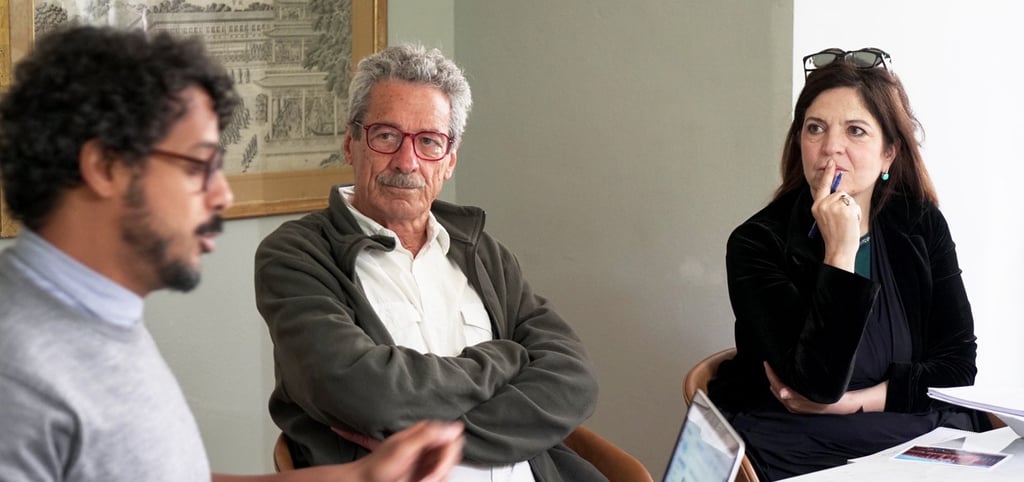CASA CINE AS SEEN BY AGNÈS JAOUI AND FERNANDO PÉREZ
CASA CINE mentors in conversation with journalist Sara Roumette.
Last year, filmmakers Fernando Pérez and Agnès Jaoui accompanied the CASA CINE residents in the development of their projects. In 2024, they are delighted to be back as mentors for the residency. Find out what they have to say about the moments of creation, work and collaboration at the Château de la Napoule!
An interview by Sara Roumette, journalist.


Fernando Pérez:
Firstly, there was a collective meeting with the four screenwriters, in order for them to get to know each other and find out what each project entailed. As it happened, the four projects were of different scales, and at different stages of development. After that came the personal work, the one-to-ones, which for me is the most important moment of exchange, where the work truly settles in... What I did was read the scripts, sequence by sequence, making observations about the narrative development of the stories.
I believe that all creative work is individual... In other words, that only the director - the creator - in this case the screenwriter, can dispose of and decide on all the elements that can make up his or her work. What I always try to do is to share, to try to interpret what the author's film is in his or her head and heart.
After three days alone with them, Agnès Jaoui arrived. Each of us worked in a different way, and I think it was very productive for them, because Agnès brought her sensibility, I brought mine, and they were confronted with these two points of view.
How did you accompany the projects during the residency?
Agnès Jaoui:
As I arrived a few days after Fernando Perez, we got together to exchange ideas and to have him tell me what he'd been working on... As it happened, we had the same feeling about what there was to work on in the scripts. Then I met with each of the screenwriters alone on several occasions, as many times as they wanted.
As for the film score composers, it was a different matter: I spoke at length with one of the participants, in particular about the confidence she could have in herself! I talked to her a lot about the quality of what I heard, what she was doing, her sensibility - when she played, it was magnificent -, and I saw how she worked with the images…
So, we're all somewhat at that point, but it's also interesting: to give confidence, and to say that even when you're established, you still have doubts. For me, it's always an oscillation between extreme doubt and the insane confidence you have to have yourself, because if you don't believe in yourself, nobody else will!
Is this how you envisioned mentoring before you started the residency?
Agnès Jaoui:
Not necessarily! You adapt to what people need. In this case, it was first or second feature films, so the participants weren't necessarily fully confident... Although...! You're always very exposed when you present work that isn't finished, and people are going to discuss it: even if they're very sympathetic, you're always vulnerable.
On the other hand, I really like writing residencies, because screenwriting is a very solitary profession, and there aren't many opportunities to meet others, to speak the same language, to confront our points of view with people who like inventing stories... And every time I participate in this kind of event, that's what speaks to me: as people who like stories and having fun with them, it's very nice to meet your peers! I meet actors all the time! Directors too... but not screenwriters!
Fernando Pérez:
Cannes is undeniably the reference among festivals! For the festival [where participants presented their projects], we focused on preparing a pitch. A collective time was devoted to this, during which we analyzed how each project pitch was going to be. This process also enabled us to understand the fundamental lines of each project. Anna Glogowski, who was there as a specialist in preparing project pitches, was a great help in this process: she drew up a very productive work plan for each resident.
To prepare a pitch - which is a process that, I must confess, I don't like very much! -, you have to find the precise meaning of your work, the work you want to do, and present it in very concise words... This helps you to establish for yourself a clearer definition of the film you want to make. In this sense, it was also very important for the residents.
And what do you think the parallel occurrence with Festival de Cannes has brought to the residents?
Fernando Pérez:
First off, it's an ideal location... It's a castle that's used as a cultural center to host residencies throughout the year (not just for cinema, but also for musicians, visual artists, etc.) It's the ideal place to develop this kind of work.
I've had experiences where residencies lasted five days, with many more participants, where the work pace was much more intense, perhaps less profound, because of the contingency of time and time pressure. What was very positive here was that the four screenwriters had time to think and work on their projects individually. It wasn't like: “We're going to follow an academic plan, as if we were in a school, with a timetable to stick to”.
Far from strict discipline, there was an absolutely anti-scholastic approach (which is what I love about these processes and what I've championed so much at the San Antonio International School in Cuba - and what sets it apart from other schools)!
Because creation has nothing to do with rules: it has to do with principles. What we need to create are creative atmospheres, and that's what we felt. I think that not only we, as mentors, but above all the participants, are very grateful for it; everyone was enriched by this anti-scholastic, anti-academic, highly creative spirit!
What's special about the CASA CINE residency ?
Agnès Jaoui:
Time! Three weeks is a luxury. I've never seen a residency last more than a week or ten days! And there was also Festival de Cannes, with all its experiences, which was obviously, I think, very interesting for them!
And apart from the splendor of the location, I also found that the whole team (at the residency and at the château) exuded benevolence, hard work, something not snobbish: in the work, fully. I never felt any judgment on this or that film, on this or that work, even though that can happen, you know! And it did not come from anyone: not from the staff, not from the residency team, and not from the participants!
This year, the CASA CINE residency will take place from May 10 to May 29 at the Château de la Napoule.


